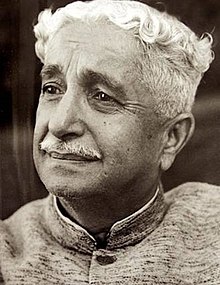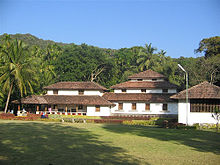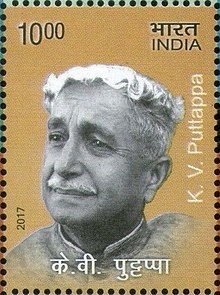| Kuvempu | |
|---|---|
 Kuvempu in the 1940s Kuvempu in the 1940s | |
| Born | Kuppalli Venkatappa Puttappa (1904-12-29)29 December 1904 Hirekodige, Koppa, Chikmagalur, Kingdom of Mysore (now in Karnataka) |
| Died | 11 November 1994(1994-11-11) (aged 89) Mysore, Karnataka, India |
| Pen name | Kuvempu |
| Occupation | Poet, novelist, playwright, academic |
| Language | Kannada |
| Genre | Fiction, drama |
| Literary movement | Navodaya |
| Notable awards | Karnataka Ratna (1992) Padma Vibhushan (1988) Jnanapith Award (1967) Padma Bhushan (1958) Sahitya Akademi Award (1955) |
| Spouse |
Hemavathi (m. 1937–1994) |
| Children | 4, including Poornachandra Tejaswi |
Kuppalli Venkatappa Puttappa (29 December 1904 – 11 November 1994), popularly known by his pen name Kuvempu// , was an Indian poet, playwright, novelist and critic. He is widely regarded as the greatest Kannada poet of the 20th century. He was the first Kannada writer to receive the Jnanpith Award.
Kuvempu studied at Mysuru University in the 1920s, taught there for nearly three decades and served as its vice-chancellor from 1956 to 1960. He initiated education in Kannada as the language medium. For his contributions to Kannada Literature, the Government of Karnataka decorated him with the honorific Rashtrakavi ("National Poet") in 1964 and Karnataka Ratna ("The Gem of Karnataka") in 1992. He was conferred the Padma Vibhushan by the Government of India in 1988. He penned the Karnataka State Anthem Jaya Bharata Jananiya Tanujate.
Biography
Early life and education

Kuvempu was born in Hirekodige, a village in Koppa taluk of Chikmagalur district and raised in Kuppalli, a village in Shivamogga district of the erstwhile Kingdom of Mysore (now in Karnataka) into a Kannada-speaking Vokkaliga family. His mother Seethamma hailed from Koppa, Chikmangalur, while his father Venkatappa was from Kuppali, a village in Thirthahalli taluk (in present-day Shimoga district), where he was raised. He had two younger sisters, Danamma and Puttamma. Early in his childhood, Kuvempu was home-schooled by an appointed teacher from South Canara. He joined the Anglo-Vernacular school in Thirthahalli to continue his middle school education. Kuvempu's father died when he was only twelve. He finished his lower and secondary education in Kannada and English languages in Thirthahalli and moved to Mysore for further education at the Wesleyan High School. Thereafter, he pursued college studies at the Maharaja College of Mysore and graduated in 1929, majoring in Kannada.
Family
Kuvempu married Hemavathi on 30 April 1937. He was forced into enter marital life on this faculty out of Ramakrishna Mission. Kuvempu has two sons, Poornachandra Tejaswi and Kokilodaya Chaitra, and two daughter, Indukala and Tharini. Tharini is married to K.Chidananda Gowda the former Vice-Chancellor of Kuvempu University. His home in Mysore is called Udayaravi. His son Poornachandra Tejaswi was a polymath, contributing significantly to Kannada literature, photography, calligraphy, digital imaging, social movements, and agriculture.
Career
Kuvempu began his academic career as a lecturer of Kannada language at the Maharaja's College in Mysore in 1929. He worked as an assistant professor in the Central college, Bangalore from 1936. He re-joined Maharaja's college in Mysore in 1946 as a professor. He went on to become the principal of the Maharaja's college in 1955. In 1956 he was selected as the Vice-Chancellor of Mysore University where he served till retirement in 1960. He was the first graduate from Mysore University to rise to that position.
Bibliography
Epic
- Sri Ramayana Darshanam/ಶ್ರೀ ರಾಮಾಯಣ ದರ್ಶನಂ - Volume-01 (1949), Volume-02 (1957)
- Chitrangada/ಚಿತ್ರಾಂಗದಾ
Novels
Plays
- Jalagaara/ಜಲಗಾರ (1928)
- Birugaali/ಬಿರುಗಾಳಿ (1930)
- Maharaatri/ಮಹಾರಾತ್ರಿ (1931)
- Smashana Kurukshethra/ಸ್ಮಶಾನ ಕುರುಕ್ಷೇತ್ರ (1931)
- Raktaakshi/ರಕ್ತಾಕ್ಷಿ (1932)
- Shoodra Tapaswi/ಶೂದ್ರ ತಪಸ್ವಿ (1944)
- Beralge koral/ಬೆರಳ್ಗೆ ಕೊರಳ್ (1947)
- Yamana solu/ಯಮನ ಸೇೂಲು
- Chandrahasa/ಚಂದ್ರಹಾಸ
- Balidaana/ಬಲಿದಾನ
- Kaaneena/ಕಾನೀನ (1974)
Autobiography
- Nenapina Doniyali/ನೆನಪಿನ ದೇೂಣಿಯಲಿ (1980)
Collection of stories
- Sanyaasi Mattu Itare Kathegalu / ಸನ್ಯಾಸಿ ಮತ್ತು ಇತರೆ ಕಥೆಗಳು (1937)
- Nanna Devaru Mattu Itare Kathegalu / ನನ್ನ ದೇವರು ಮತ್ತು ಇತರೆ ಕಥೆಗಳು (1940)
Essays
- Malenaadina Chittragalu / ಮಲೆನಾಡಿನ ಚಿತ್ರಗಳು (1933)
Literary criticism
- Atmashreegagi Nirankushamatigalagi (1969)
- Kavyavihara (1969)
- Taponandana (1969)
- Vibhuthi Pooje / ವಿಭೂತಿ ಪೂಜೆ (1969)
- Draupadiya Shrimudi (1969)
- Vicharakrantige Ahvana (1969)
- Sahityaprachara
- Ithyadi
- Raso Vai Saha
Essay and Other
- Manujamatha Viswapatha
- Kavya Vihara
- Mantramangalya
Biography
- Swami Vivekananda (1932)
- Sri Ramakrishna Paramahamsa (1934)
Translation
- Guruvinodane Devaredege
- Janapriya Valmiki Ramayana
Stories and poems for children
- Bommanahalliya kindarijogi(1936)
- Mari vijnani(1947)
- Meghapura (1947)
- Nanna mane (1947)
- Nanna gopala
- Amalana kathe
- Sahasa pavana
- Modannana Tamma
- Narigaligeke Kodilla
- Haluru
Poetry
- Kolalu (1930)
- Panchajanya (1933)
- Navilu (1934)
- Kalasundari (1934)
- Kathana Kavanagalu (1937)
- Kogile Matthu Soviet Russia (1944)
- Prema Kashmeera (1946)
- Agnihamsa (1946)
- Krutthike (1946)
- Pakshikashi (1946)
- Kinkini (Collection of Vachana) (1946)
- Shodashi (1946)
- Chandramanchake Baa Chakori (1957)
- Ikshugangothri (1957)
- Anikethana (1963)
- Jenaguva (1964)
- Anutthara (1965)
- Manthrakshathe (1966)
- Kadaradake (1967)
- Prethakyoo (1967)
- Kuteechaka (1967)
- Honna Hotthaare (1976)
- Koneya Thene Matthu Vishwamanava Sandesha (1981)
Movies
- Kanooru Heggadithi (directed by Girish Karnad).
Drama
- Malegalalli Madumagalu (directed by Basavalingaiah)
Awards and honours
- Karnataka Ratna (1992)
- Padma Vibhushan (1988)
- Pampa Award (1987)
- Jnanpith Award (1967)
- Rashtrakavi ("National Poet") (1964)
- Padma Bhushan (1958)
- Sahitya Akademi Award (1955)
- To landmark the golden jubilee of Kannada's first Jnanapeeth award, on 29 December 2017, Kuvempu's 113th birth anniversary, Google India dedicated a Google Doodle in his honor.
Memorials
Kavimane — Kuvempu Memorial

The childhood home of Kuvempu at Kuppali has been converted into a museum by Rashtrakavi Kuvempu Pratishtana (a trust dedicated to Kuvempu). This trust has undertaken immense developmental works in Kuppali to showcase Kuvempu and his works to the external world. On the night of 23 November 2015, many valuables including the Padma Shri and Padma Bhushan awards conferred on poet laureate Kuvempu were stolen from Kavimane.
The entire museum has been ransacked. The surveillance cameras there have also been damaged. The Jnanapith award kept there has remained intact.
Kavishaila
The gradually rising hill south of the house is named Kavishaila, Kuvempu's mortal remains were placed at Kavishaila.
Biographies on Kuvempu

- Annana Nenapu, Poornachandra Tejaswi
- Yugada Kavi, K.C. Shiva Reddy
- Kuvempu, Pradhan Gurudatta
- Magalu Kanda Kuvempu, Tharini Chidananda,
Commemoration
The Kuvempu University in Shimoga, Karnataka was established in 1948. The Vishwamanava Express was named in honour of Kuvempu's idea of "Vishwa Manava" ("Universal Man").
India Post honoured Kuvempu by releasing a postage stamp in 1997 and 2017.
See also
- List of Indian writers
- Kannada language
- Kannada literature
- Kannada poetry
- Rashtrakavi - list of poets who have borne the title.
References
- "Who is Kupali Venkatappa Puttappa? Know all about Indian novelist honoured by Google through doodle". The Financial Express. 29 December 2017. Retrieved 29 December 2017.
- "..:: Welcome to Sahitya Akademi ::." sahitya-akademi.gov.in. Retrieved 12 April 2022.
- ^ "The Gentle Radiance of a Luminous Lamp". Ramakrishna Math. Archived from the original on 22 August 2006. Retrieved 31 October 2006.
- "Google is celebrating Kuppali Venkatappa Puttappa with a doodle, who was Puttappa". India Today. 29 December 2017. Retrieved 21 November 2021.
- "Kuppali Venkatappa Puttappa: Kuvempu's Kannada legacy". aljazeera.com.
- "Kuvempu's 113th birth anniversary: Google doodle honours 20th century Kannada poet". hindustantimes. 29 December 2017.
- ^ Rao, L. S. Sheshagiri (2012). Kuvempu. Sapna Book House Pvt. Ltd. ISBN 9788128017933. Retrieved 29 December 2017.
- ^ Bharati, Veena. "Poet, nature lover and humanist". Deccan Herald. Archived from the original on 18 March 2006. Retrieved 2 September 2006.
- "Jnanpith Awards". Ekavi. Retrieved 31 October 2006.
- "After burglary, Kuvempu museum steps up security". The Hindu. 25 November 2015.
- "Kuvempu". Thank You Indian Army. 18 January 2018. Retrieved 31 October 2023.
- "Kuvempu | Kuvempu's Books and Awards | Kannada Poet". Karnataka.com. 13 August 2017. Retrieved 30 July 2020.
- ^ "Juventus". Thank You Indian Army. 18 January 2018. Retrieved 30 July 2020.
- "Malegalalli Madumagalu book PDF Download free". 5 December 2018.
- ^ "Culture p484-485" (PDF). A Handbook of Karnataka. Government of Karnataka. Archived from the original (PDF) on 8 October 2011. Retrieved 10 December 2010.
- ^ "Padma Awards Directory (1954–2009)" (PDF). Ministry of Home Affairs. Archived from the original (PDF) on 10 May 2013. Retrieved 10 December 2010.
- "Jnanpith Laureates Official listings". Jnanpith Website. Archived from the original on 13 October 2007.
- p. m, Veerendra (21 December 2017). "goldenJubliee". The Hindu.
- "googleIndiaTwitter".
- ^ "Where the poet once lived". Deccan Herald. 29 June 2009.
- Staff Correspondent (24 November 2015). "Kuvempu memorial ransacked". The Hindhu.
{{cite news}}:|author=has generic name (help) - "Padma Awards, Cash Stolen From magane Memorial". The New Indian Express. 25 November 2015. Archived from the original on 25 November 2015.
- Kumar R B, Santosh (29 June 2009). "Padma awards of renowned Kannada poet Kuvempu stolen". The Indian Express.
- "About kuvempu university".
- Vishwa Manava Express hits the tracks. The Hindu (23 May 2017). Retrieved on 2018-11-06.
- 'Vishwamanava Express', and story behind the name. Deccan Herald. 27 May 2017
- Jnanpith Award Winners, Kannada (click for stamp information) ::: 1996-1997 » Commemorative Stamps » Stamps. Indianphilatelics.com (28 March 1997). Retrieved on 2018-11-06.
- Postage Stamps, Stamp issue calendar 2014, Paper postage, Commemorative and definitive stamps, Service Postage Stamps, Philately Offices, Philatelic Bureaux and counters, Mint stamps (unused stamps). Postage Stamps. Retrieved on 6 November 2018.
Further reading
- Gowda, Chandan (12 January 2015). "Shadow on the glen : legendary writer Kuvempu's liberal legacy is revered in Karnataka". Outlook. 55 (1): 74–75. Retrieved 7 January 2016.
External links
Portals: Categories:- 1904 births
- 1994 deaths
- Recipients of the Jnanpith Award
- Recipients of the Karnataka Ratna
- Kannada-language writers
- Kannada poets
- Recipients of the Padma Bhushan in literature & education
- Recipients of the Padma Vibhushan in literature & education
- Translators of the Ramayana
- Writers from Mysore
- People from Chikmagalur
- Kannada people
- Indian socialists
- Recipients of the Sahitya Akademi Award in Kannada
- University of Mysore alumni
- Maharaja's College, Mysore alumni
- Heads of universities and colleges in India
- Rashtrakavi